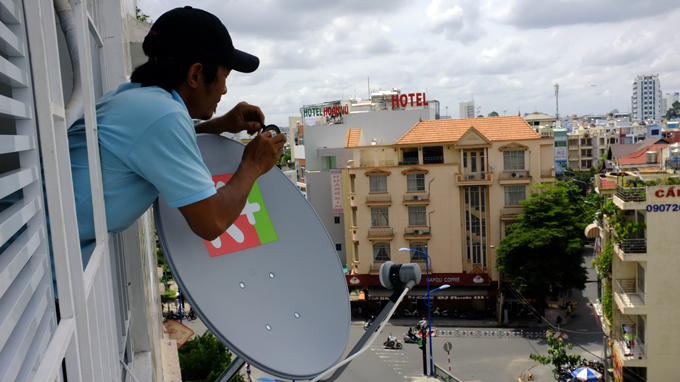The Vietnam Competition Administration Department and the Paid Television Association launched a workshop on September 10 to cope with the monopoly among local paid television service providers and protect its customers.
Nguyen Phuong Nam, deputy head of the Vietnam Competition Administration Department (VCAD), opened the workshop by affirming that in the paid TV sector, a number of local providers have a monopoly and show signs of dominating the market.
According to Tran Phuong Lan, from the department, the local paid TV sector earned a total of US$2 billion in 2011, and $2.5 billion in 2012.
She noted that a handful of local businesses like Saigontourist Cable Television (SCTV) and Vietnam Cable Television (VCTV) are dominating the market. In 2012 SCTV occupied 40% of the market share, while VCTV took 30%.
Lan pointed out that most of the market share is concentrated on state-owned businesses which belong to major TV stations. Vietnam Television (VTV) alone accounts for up to over 70%.
The department also noted that soaring TV copyright fees have pushed cable TV user fees considerably higher, while the quality remains almost unchanged.
For instance, the copyright fee for the English Premier League (EPL) television rights jumped from $4 million in the 2007-2010 period to $37.5 million for the 2013-2016 period.
Unhealthy competition also mars the local market, as some providers use their channels to criticize their opponents and their services. Large providers also force their partners to ink exclusive contracts with them, which deprives smaller providers of access to certain television content or stops them from offering their services to big clients, Lan added.
The monopoly also diminishes fee competitiveness, as the fees collected from customers are usually fixed by providers in an advantageous position.
Several smaller businesses, such as Hanoi Cable Television (HCATV) and VTC, also complained that K+, which occupies a mere 3% of the local stake, wouldn’t share its EPL copyrights with them, and urged the VCAD to do something about the issue.
Vu Van Hien, chair of the Paid Television Association, maintained that by no means does the paid TV sector earn $2 billion each year, adding that even now, cable TV providers’ profits remain meager. However, he agreed that K+’s refusal to share its EPL copyright with other providers isn’t acceptable.
To cope with unhealthy competition and protect consumer rights, paid TV providers are requested to register their readily-made contracts which they ask their clients to sign with the VCAD or the Department of Industry and Trade for approval. Penalties will be imposed on violators.
According to Cao Xuan Quang, from the VCAD, many providers’ contracts contain serious violations, as they feature terms that evade their responsibility and restrict their clients’ rights. Some providers even give their clients illegible, baffling contracts.
Lan, from the department, added that VCAD will propose that revisions be made to the local Competition Law to stop paid TV service providers from paying residential area investors so that they can offer exclusive TV services in certain areas.
Nguyen Ha Yen, from the Ministry of Information and Communication, said that the ministry is reshuffling the local paid TV market so that there will be only 20 providers left by the of this year.
Duong Quoc Huy, vice director of SCTV, said the local market will see intense competition with the arrival of newcomers Viettel, FPT and AVG. He also urged measures to protect service providers as well.
The Prime Minister last month approved the plan to develop local radio and television services by 2020, which forecasts that 60-70% of households nationwide will use paid television services by that time.
There are roughly 18.2 million households with television sets in Vietnam. Among them, nearly 12.6 million are currently using antennas.



















































